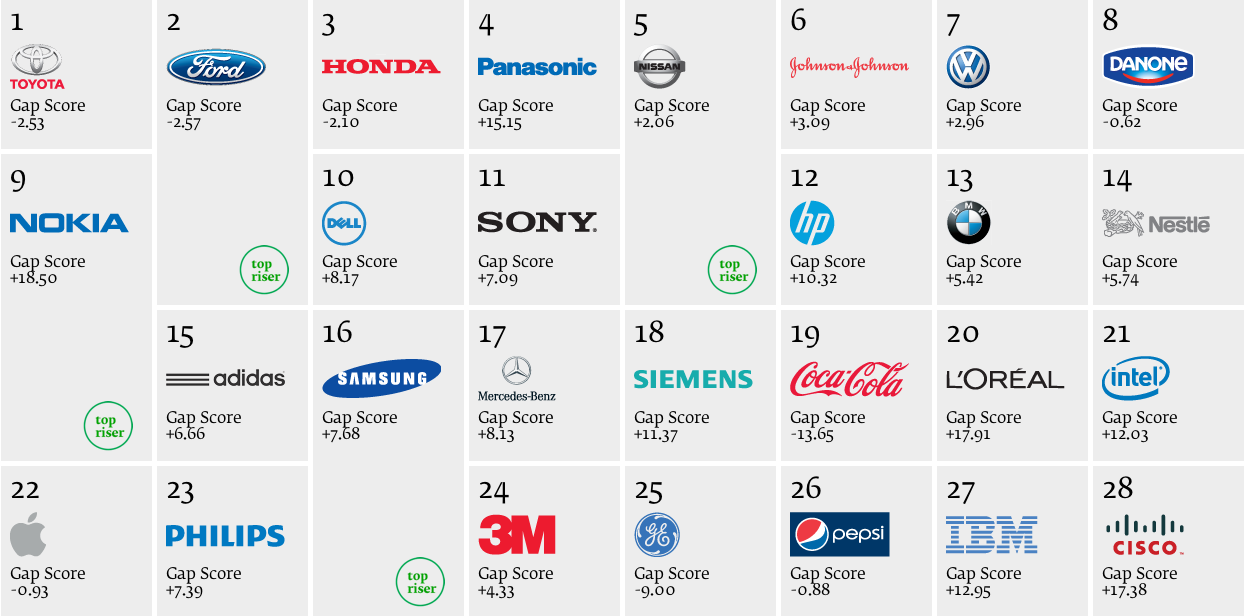The global branding agency Interbrand has released its annual ranking of the most environmentally-friendly brands in 2013. The report, based on the data from the firm’s “Best Global Brands 2013” research, examines 50 “Best Global Green Brands” that have shown the highest level of sustainability performance and perception, which means that these businesses source, produce and distribute goods and service in a sustainable manner, while at the same time educate their audiences about the advantages of sustainable practices.
The difference between the score that a brand gains for performance and the perception score is referred to by Interbrand as «the gap», where a positive index infers that performance is higher than customers perceive it to be; while a negative gap, vice versa, indicates that a brand’s green credentials are overestimated by customers. Both performance and perception score has been assessed by Interbrand’s partner on this project, financial and management consulting firm Deloitte.


Electric car manufacturers are on the top of the ranking
As in the two previous years, Toyota again has been named the greenest brand of 2013, particularly due to its energy-saving, sustainable hybrid-electric car Toyota Prius, which sold 2.9 million units in 2012. Remarkably, other automotive brands, such as Ford (#2), Honda (#3), Nissan (#5), and Volkswagen (#7), also top the list as a result of their significant and continuous achievements in the development of environmentally-friendly solutions for the car industry (Ford EcoBoost, Nissan LEAF to name a few). Nissan, which has moved 16 positions up this year, appears as the top riser in the 2013 ranking, for its LEAF electric car that the company claims to be «the most widely sold electric passenger car of all times.» It’s fair to say that some truly innovative and word-changing automotive brands, such as Tesla and Hiriko, are not on the Interbrand’s list yet.
High-tech brands dominate the overall ranking
Traditionally, the 2013 greenest global brands ranking primarily consists of technology and telecommunications businesses, such as Nokia (#9), Dell (#10), Sony (#11), HP (#12), Samsung (#16) and others, led by Panasonic (#4), which is marked as the greenest tech brand, mainly, for its revolutionary energy-saving light bulbs.
The much-loved Apple has sadly landed approximately in the middle of the list on the 22nd place with a negative 0.93 «gap score».
Green efforts of hight-street brands are not in vain
Call it greenwashing, nevertheless, H&M(#42), ZARA(#48), adidas (#15) and Nike (#31) are also among the most eco-friendly brands of 2013, according to the Interbrand’s ranking. Amongst other achievements, adidas has been marked for its DryDye water-saving technology; Nike has received recognition for the development of sustainable textiles for the shoe industry; H&M has launched a garment-recycling in-store initiative across its 48 international markets, plus signed onto the agreement that guarantees safety and decent labour conditions for Bangladeshi workers involved in the so-called ready-made garment industry—Accord on Fire and Building Safety; ZARA is reported to have built an eco-friendly store in New York that features motion detectors to reduce energy consumption. Although, wouldn’t it be great if these companies, along with all the worthwhile green commitments they’ve demonstrated, just cut down the volumes of production and encouraged consumers to buy fewer needless 10-dollar tees?
Being green is profitable, not just cool
Earlier this year, in February 2013, another research and consulting expert BCG revealed a report, which showed that in 2,600 surveyed companies profit in 2012 rose 23% up to 37% of the total as a result of their sustainability efforts. The survey, conducted together with the MIT Sloan Management Review (MIT SMR), also found that 50% of respondents had changed three or four business model elements in 2012, while 60% said they had sustainability as a permanent fixture on their management agenda—and that directly correlated with the increase in profit in their companies.
Between numerous lines of obvious, generalized recommendations, the BCG/MIT SMR’s report on Sustainability and Innovation includes some valuable insight on sustainable practices from AT&T, Campbell Soup Company, Dell, Ecover, and many more.
The full version of the Best Global Green Brands 2013 report along with related articles, interviews, imagery and downloadable PDF is available at Interbrand’s website.